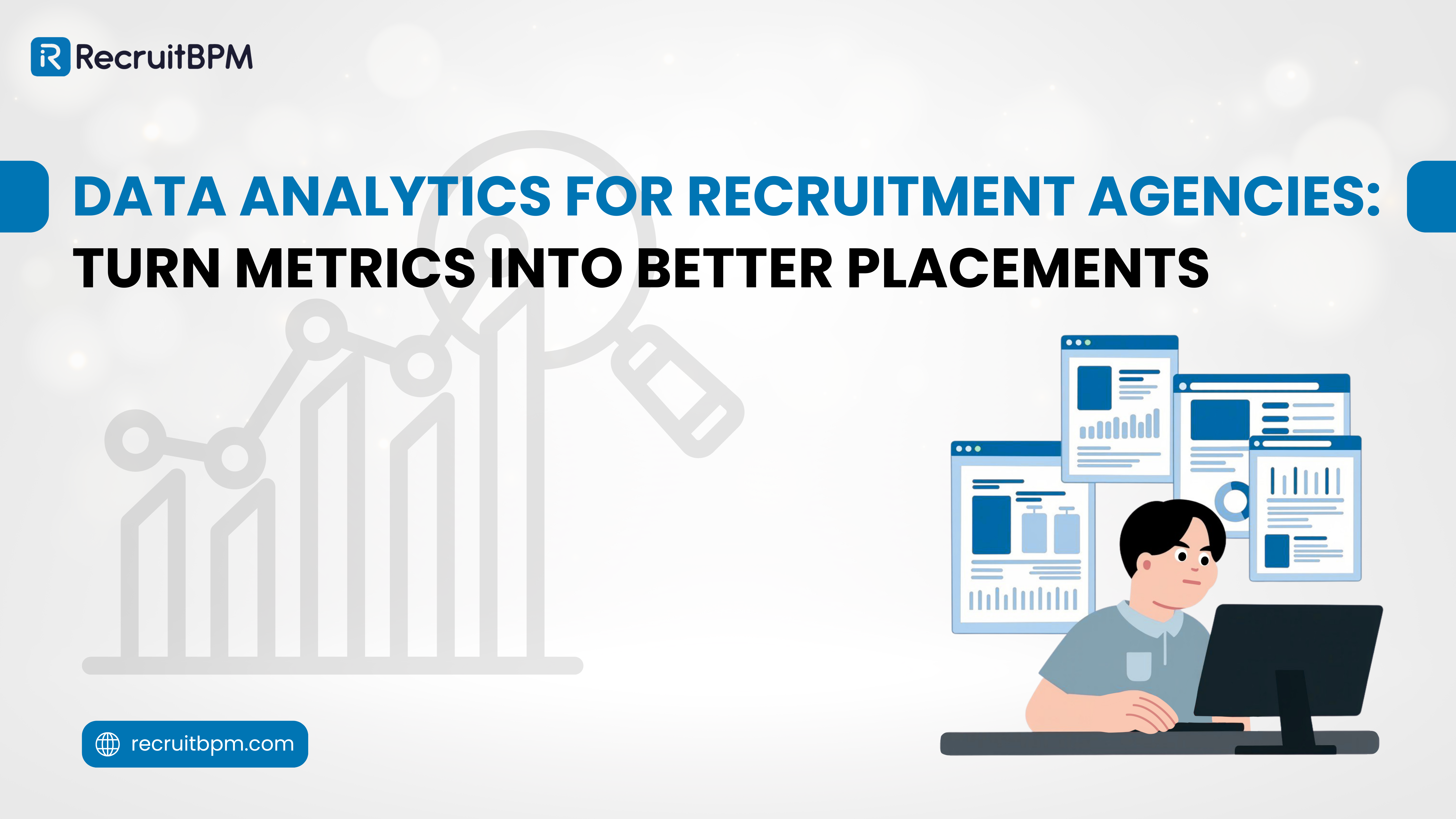Making hiring decisions based on intuition might feel natural. However, this approach costs recruitment agencies thousands in lost revenue annually.
Consider this scenario: Your recruiter believes LinkedIn delivers the best candidates. Meanwhile, your data shows referrals convert 40% faster with higher retention rates. Without a recruitment analytics dashboard, you’re allocating resources to less effective channels.
The staffing industry loses an estimated $680 billion annually due to poor hiring decisions. For recruitment agencies, this translates to extended time-to-fill metrics, decreased client satisfaction, and diminished profit margins.
Data-driven recruitment decisions eliminate guesswork. They reveal which sourcing channels actually work, which recruiters need support, and where your hiring pipeline stalls. Most importantly, they show you where to invest for maximum return.
The real question isn’t whether you need analytics. It’s whether you can afford to operate without them.
Essential Recruitment Analytics Your Dashboard Should Track
Not all recruitment KPIs deserve equal attention. Your analytics dashboard should focus on metrics that directly impact placement success and agency profitability.
Time-to-fill remains the most critical hiring pipeline metric. This measures days from job requisition to candidate acceptance. Industry benchmarks suggest 42 days, but top agencies achieve fills in 30 days or less.
Submittals-to-interview ratio reveals candidate quality. If you’re submitting ten candidates for every interview, your screening process needs refinement. High-performing agencies maintain ratios between 3:1 and 5:1.
Placement rate shows overall effectiveness. Calculate this by dividing successful placements by total job orders. Healthy agencies achieve 20-30% placement rates depending on specialization.
Candidate source effectiveness tracks which channels deliver qualified talent. This recruitment data visualization helps you allocate sourcing budgets intelligently rather than spreading resources thin across every platform.
Revenue per recruiter indicates team productivity. This talent acquisition analytics metric helps identify training opportunities and compensation benchmarks. Top performers generate $200,000-$400,000 annually, depending on market and specialization.
Your applicant tracking metrics should surface these insights automatically. Manual calculation wastes valuable time that recruiters should spend engaging candidates and clients.
Pipeline Velocity Metrics: Identifying and Eliminating Bottlenecks
Every recruitment pipeline contains hidden friction points. Pipeline velocity metrics expose exactly where candidates stall and why.
Stage-specific conversion rates reveal bottlenecks. If 50% of candidates pass initial screening but only 10% reach client interviews, you’ve identified a problem area requiring immediate attention.
Track the average time in each stage. Candidates sitting in “client review” for two weeks signal either unresponsive clients or unclear expectations. This recruiter performance metric helps you address issues before losing engaged candidates.
Drop-off analysis shows where and why candidates exit your process. High abandonment during application suggests forms are too lengthy. Withdrawals after screening indicate compensation misalignment or poor candidate experience.
Consider velocity across different job types. Technical roles might naturally take longer than administrative placements. Your recruitment dashboard best practices should segment data accordingly rather than treating all positions identically.
Real-time pipeline health indicators prevent crisis situations. When your dashboard flags declining velocity early, you can intervene before missing deadlines or disappointing clients.
Advanced analytics platforms enable customizable dashboards tailored to your agency’s unique pipeline stages. This flexibility ensures you’re measuring what actually matters for your business model.
Candidate Engagement Analytics: Preventing Drop-Offs Before They Happen
Candidate engagement directly impacts placement success. Yet most agencies lack visibility into engagement patterns until it’s too late.
Email open and response rates indicate interest levels. If outreach emails achieve less than 25% open rates, your messaging needs improvement. Top agencies see 40-50% opens with compelling, personalized communication.
Application abandonment rates highlight friction in your process. Industry data shows 60% of candidates abandon applications that take longer than five minutes. Simplify your forms or lose half your potential talent pool.
Communication frequency analysis reveals optimal touchpoint patterns. Too many messages annoy candidates. Too few let them forget about opportunities. Data shows weekly contact maintains engagement without overwhelming prospects.
Track response time to candidate inquiries. Candidates expect replies within 24 hours. Delays beyond 48 hours typically result in lost interest. Your analytics should flag slow response patterns immediately.
Candidate satisfaction scores predict future placements and referrals. Simple post-interaction surveys provide invaluable feedback. Agencies with 8+ satisfaction scores consistently outperform competitors in both placements and candidate referrals.
Predictive hiring analytics can identify candidates likely to disengage based on historical patterns. Proactive outreach to at-risk candidates prevents pipeline shrinkage before it impacts your numbers.
Revenue Per Recruiter: Understanding Your Team’s True Productivity
Not all recruiter activity generates equal value. Revenue per recruiter cuts through activity metrics to reveal true productivity.
Calculate this by dividing total placement fees by the number of active recruiters. This talent acquisition analytics benchmark helps you understand team performance objectively.
Industry benchmarks vary significantly by specialization. Executive search recruiters might generate $400,000-$600,000 annually. High-volume staffing recruiters typically produce $150,000-$250,000. Understanding your market’s norms provides realistic performance expectations.
Beyond raw numbers, examine revenue per recruiter by experience level. New recruiters shouldn’t match veteran performers immediately. However, they should show consistent growth trajectories. Stagnant productivity signals training gaps or role misalignment.
Activity-to-revenue correlation separates busy work from productive effort. Some recruiters make 100 calls weekly with minimal placements. Others make 40 strategic calls with double the results. Your recruitment analytics dashboard should surface these patterns.
Track specialization impact on productivity. Recruiters focusing on specific industries or roles typically outperform generalists. Data might reveal that niching down increases individual revenue 30-50% within the same activity levels.
Team-level analytics identify collaboration patterns affecting productivity. Agencies encouraging knowledge sharing and split placements often see higher overall revenue per recruiter than competitive internal environments.
Use these insights for compensation planning, territory assignments, and professional development. Data-driven talent management creates stronger recruitment teams.
Client Relationship Metrics: Predicting Churn Before It Happens
Losing clients costs more than just immediate revenue. Replacing one client requires 5-7 new client acquisitions to offset the impact.
Fill ratio measures placements delivered versus total job orders received. Ratios below 15% signal problems. Clients submitting multiple orders with few fills will eventually seek other agencies.
Time-to-fill by client reveals relationship health. Consistently slow fills indicate unrealistic expectations, poor job descriptions, or challenging hiring environments. Address these proactively through data-backed conversations.
Client satisfaction scores predict retention. Quarterly surveys asking specific questions about responsiveness, candidate quality, and partnership value provide early warning systems. Scores below 7/10 require immediate intervention.
Track repeat business rates. One-time clients cost more to acquire than they generate in revenue. Your recruitment ROI tracking should identify which clients become long-term partners and why.
Communication frequency with key accounts impacts retention. Data consistently shows that regular touchpoints beyond active job orders strengthen relationships. Agencies maintaining monthly contact even during slow periods retain clients 40% longer.
Candidate quality metrics like 90-day retention rates and performance reviews help you demonstrate value quantitatively. Clients appreciate agencies that measure placement success beyond initial acceptance.
Advanced analytics platforms enable client-specific dashboards. Sharing performance data during business reviews positions your agency as a strategic partner rather than a transactional vendor.
Where Your Best Candidates Actually Come From?
Most agencies waste sourcing budgets on channels delivering minimal results. Sourcing channel ROI analysis redirects investment toward productive channels.
Cost per candidate by source reveals efficiency. LinkedIn Recruiter costs $8,000+ annually. If it generates only 5% of your placements while consuming 25% of your sourcing budget, reallocate those resources.
Quality of hire by source matters more than quantity. Job boards might deliver 100 applications weekly. Employee referrals might generate only 10. However, if referrals convert to placements at 5x the rate, they’re your most valuable channel.
Track time-to-fill by candidate source. Candidates from certain channels typically move faster through pipelines. Understanding these patterns helps you prioritize sourcing strategies based on client urgency.
Placement rate by source shows ultimate effectiveness. A channel generating many applicants but few placements wastes recruiter time screening unqualified candidates. Focus on sources with 15%+ placement rates.
Long-term retention by source indicates placement quality. Candidates lasting 12+ months in roles demonstrate successful matches. If specific sources consistently deliver durable placements, invest more heavily there.
Consider source effectiveness by role type. Technical positions might perform best with specialized job boards. Executive searches require different sourcing approaches than high-volume staffing roles.
Your recruitment data visualization should make these comparisons instantly accessible. Quick insights enable agile sourcing strategy adjustments rather than annual planning cycles.
Real-Time Analytics vs. Historical Reporting: Why Both Matter?
Many agencies treat analytics as backward-looking reports. This approach misses half the value data provides.
Historical reporting establishes baselines and identifies trends. Understanding last quarter’s metrics helps set realistic goals and spot seasonal patterns affecting your hiring pipeline.
Year-over-year comparisons reveal growth trajectories. Are you placing more candidates? Generating higher revenue per placement? Improving time-to-fill? Historical data quantifies progress objectively.
Real-time analytics enable immediate course corrections. When a recruiter’s pipeline suddenly empties, waiting until the month-end reports to notice creates a three-week gap in productivity.
Live dashboards flag issues requiring urgent attention. Client satisfaction dropping? Pipeline velocity slowing? Candidate engagement declining? Real-time alerts enable proactive management rather than reactive firefighting.
Predictive analytics leverage historical patterns to forecast future outcomes. Machine learning algorithms can predict which candidates will accept offers, which clients might churn, and which job orders will prove challenging to fill.
Combine all three approaches for a comprehensive recruitment analytics dashboard functionality. Historical data provides context. Real-time monitoring enables agility. Predictive insights support strategic planning.
The most effective agencies review real-time dashboards daily, analyze historical trends weekly, and incorporate predictive insights into quarterly planning sessions.
Customizable Dashboards: Tailoring Analytics to Your Agency’s Unique Needs
Generic analytics rarely address specific agency needs. Customizable dashboards ensure you’re measuring what actually matters for your business model.
Role-based views provide relevant information to different team members. Recruiters need pipeline and candidate engagement metrics. Sales teams require client relationship and business development data. Leadership wants financial and strategic performance indicators.
Workflow-specific metrics align with your unique processes. Agencies using retained search models need different analytics than those doing contingent staffing. Your recruitment dashboard best practices should reflect your operational reality.
Industry-specific benchmarks provide meaningful comparisons. Healthcare staffing agencies face different challenges than IT recruiting firms. Built-in industry benchmarks help you understand performance relative to relevant peers.
Custom KPI creation addresses business-specific goals. Perhaps you’re focused on expanding into new markets or improving diversity hiring. Your analytics platform should support creating and tracking custom metrics aligned with strategic priorities.
Visual customization improves usability. Some team members prefer charts and graphs. Others want detailed data tables. Flexible visualization options ensure everyone can interpret data effectively.
Automated alerts notify relevant people when metrics cross thresholds. Configure notifications for declining pipeline health, approaching deadlines, or exceptional performance. Automation ensures critical insights never get buried in reports.
Integration with existing tools creates unified data ecosystems. Your analytics should pull from your applicant tracking system, CRM, financial software, and communication platforms. Siloed data limits analytical power.
From Data to Decisions: Building Your Analytics-Driven Recruitment Strategy
Collecting data means nothing without action. Building an analytics-driven recruitment strategy requires systematic implementation.
Start with a baseline measurement. You can’t improve what you don’t measure. Spend your first month simply collecting data across key recruitment KPIs. Understand current performance before setting improvement targets.
Identify your biggest constraints. Data will reveal where your agency struggles most. Perhaps time-to-fill exceeds industry norms. Maybe recruiter productivity lags benchmarks. Focus initial improvements on areas with the highest impact potential.
Set data-backed goals. Rather than arbitrary targets, use benchmarks and historical trends to establish realistic objectives. If your current time-to-fill averages 45 days, aiming for 30 days within one quarter might prove unrealistic. Target 40 days first.
Create accountability through transparency. Share relevant metrics with your team. When everyone understands performance expectations and can track their progress, accountability naturally increases.
Establish review cadences. Daily dashboard checks catch immediate issues. Weekly team reviews identify trends. Monthly leadership analysis assesses strategic progress. Consistent review rhythms embed data into your culture.
Test and iterate. Use data to evaluate new approaches. Trying a new sourcing channel? Track its performance against existing channels before fully committing resources. Data removes emotion from decision-making.
Celebrate wins. When metrics improve, recognize the efforts driving those improvements. Data-driven cultures thrive when teams see how their work translates into measurable success.
Invest in training. Not everyone naturally understands analytics. Provide education on interpreting dashboards, understanding key metrics, and applying insights. Data literacy strengthens your entire organization.
Building an analytics-driven approach doesn’t happen overnight. However, agencies committing to data-driven decision making consistently outperform competitors operating on intuition alone.
Transform Your Recruitment Process with Intelligent Analytics
The difference between average and exceptional recruitment agencies often comes down to how they use data. Analytics reveal opportunities intuition misses and flag problems before they escalate.
Your hiring pipeline contains valuable insights waiting to be discovered. The right recruitment analytics dashboard transforms raw numbers into strategic advantages.
Modern talent acquisition demands more than gut feelings and best guesses. It requires understanding what works, why it works, and how to replicate success consistently.
Data-driven recruitment isn’t about replacing human judgment. It’s about enhancing decision-making with objective insights that complement experience and expertise.
Ready to see how analytics can transform your recruitment outcomes? Discover how RecruitBPM’s customizable analytics empower agencies to make smarter hiring decisions and accelerate placement success.
Explore RecruitBPM’s analytics capabilities and schedule a personalized demo today.

















